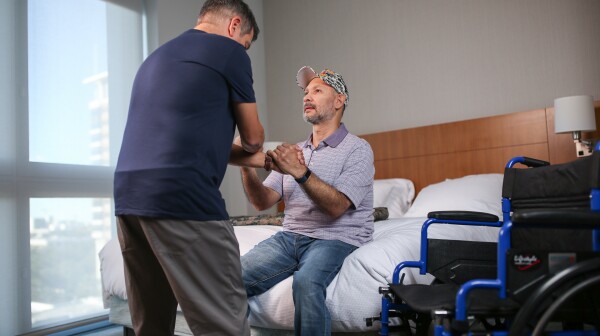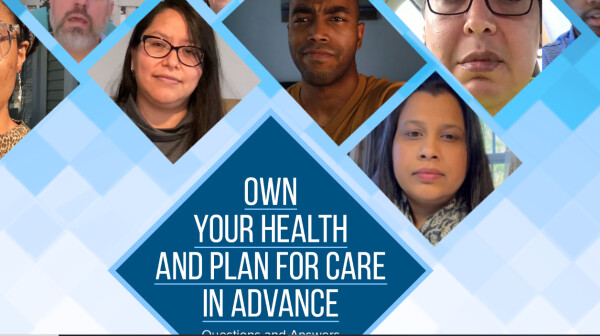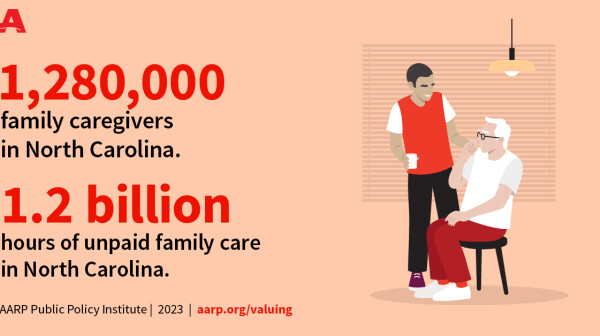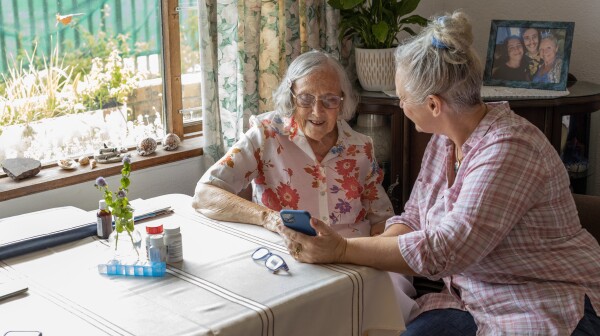AARP Eye Center
CLOSE ×
Search
Popular Searches
- right_container
- Health
- Money
- Work & Jobs
- Advocacy
- Social Security
- Medicare
- Caregiving
- Games
- Travel
- More...
- Entertainment & Style
- Family & Relationships
- Personal Tech
- Home & Living
- Auto
- Staying Sharp
- Podcasts
- Videos
North Carolina is facing a shortage of nursing home and home-care workers. During this year’s legislative session, AARP North Carolina is working to educate state lawmakers about the issue.
No matter where you are in the caregiver journey, these local agencies and organizations can help make the process easier
WASHINGTON, D.C. – Senators Thom Tillis (R-NC) and Maggie Hassan (D-NH) recently introduced the Connecting Caregivers to Medicare Act, bipartisan legislation to increase outreach and education to Medicare beneficiaries and simplify access to information for family caregivers.
RALEIGH, NC – North Carolinians who provide care for veterans spend on average $11,500 of their personal income on out-of-pocket costs related to caregiving each year—1.5 times higher than what other family caregivers spend ($7,242), according to AARP data. And 43 percent of veteran and military caregivers experienced at least one financial setback such as having to take on more debt or dip into personal savings, according to research from AARP and the National Alliance for Caregiving.
WASHINGTON-- AARP strongly supports new bipartisan legislation, the Alleviating Barriers for Caregivers Act, which would make it easier for family caregivers to navigate key financial and health care programs. The bill was introduced today by Senators Edward Markey (D-MA) and Shelley Moore Capito (R-WV) and is co-sponsored by Senators Kyrsten Sinema, (I-AZ), Susan Collins (R-ME), Bob Casey (D-PA) and Thom Tillis (R-NC).
“Uplifting” isn’t a word usually associated with death and dying, but AARP’s film presentation last Friday showed how it might be possible. Perhaps the applause and the smiles from the audience said it all: the more you know about modern ways of dying, the more empowered you are to make your own end-of-life journey exactly what you want it to be.
The bill would require that less-restrictive alternatives be considered before resorting to court-ordered guardianships for older North Carolinians and people with disabilities.
AARP North Carolina is working to make it easier for residents to get advance directives in place on how they want to be cared for during a serious illness. “Advance care planning empowers individuals to make their own important health care decisions while they are still able, bringing peace of mind to individuals and their families,” says Virginia Slocum, executive director of the North Carolina Serious Illness Coalition.
Latest AARP research attaches monetary value to the estimated hours of unpaid care that North Carolina family caregivers provided in 2021.
Updates are needed to improve North Carolina's guardianship laws
Search AARP North Carolina
Connecting you to what matters most, like neighbors do. Find events, volunteer opportunities and more near you.
Sign Up & Stay Connected










































































